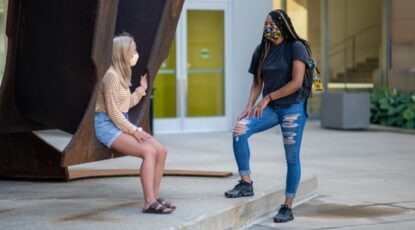Education & Society
-
Fight the policy, not the politician
The presidential election is near, but it’s no time to ease up on Black Lives Matter and other social movements, says Mary Frances Berry, PhD ’66/JD ’70/HLLD ’97. The author of ‘History Teaches Us to Protest’ says the fight to change policy is just beginning.
-
Schlissel, Collins explain fall semester virus testing plans
Reopening plans are based on recommendations of the Centers for Disease Control and Prevention, the state of Michigan, and experts from public health, education, medicine, engineering, and more.
-
Meeting unprecedented challenges
President Schlissel presents the latest news re: Fall 2020, including customized services provided by experts and students in U-M’s School of Public Health.
-
July 2020: Coronavirus and U-M
From making drug discoveries to fighting pandemic-related food insecurity, here is a roundup of the latest news, features, and other campus updates regarding COVID-19.
-
Cruel, cruel summer
The mental health toll of caring for COVID-19 patients will require long-lasting attention, experts predict. And the summer surge is blazing.
-
The COVID-19 curve has unflattened. Fast. Now what?
Pandemic historians who showed the power of efforts to ‘flatten the curve’ say it will take all-out effort by individuals, industry, and elected officials to reduce death and suffering until vaccines are available.
-
Schlissel, Collins outline fall plans to faculty at town hall
U-M will test students for the coronavirus, allow highly at-risk faculty to teach remotely, and implement other measures aimed at keeping people safe while preserving a quality education that includes as much in-person instruction as possible.
-
When a student activist goes pro
Robert Greenfield, BS ’15, was treasurer for the Black Student Union and helped launch 2013’s Being Black at Michigan campaign. The Oakland, Calif.-based entrepreneur is back on the protest lines and finds his 20-something peers are ‘far too tired, far too early, given their age.’
-
‘Build something that wasn’t there before’
More than 82 percent of Detroit’s homeless families are led by single women. Amy Good, BA ’77/MSW ’80, answered her mentor 30 years ago by co-founding Alternatives for Girls. The Detroit nonprofit helps young women in crisis or at-risk for abuse, human trafficking, and more.










